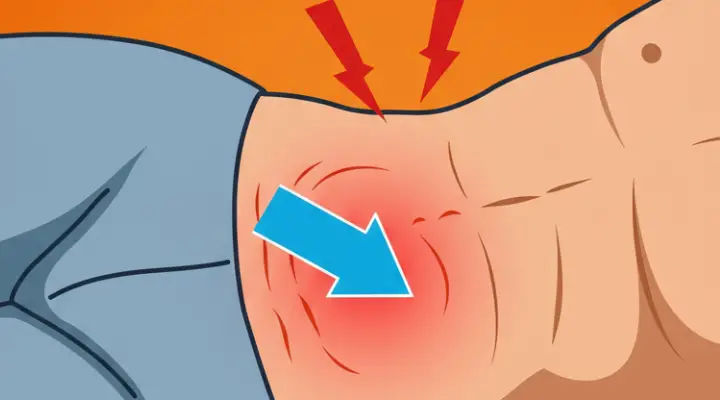Colon cancer is one of the most common and deadly cancers, yet it often goes undetected until it reaches an advanced stage. While many people are aware of classic symptoms such as rectal bleeding, persistent changes in bowel habits, and unexplained weight loss, there are several unusual signs of colon cancer that are frequently overlooked. Recognizing these warning signals early could be life-saving. Below, we explore some of these lesser-known symptoms of colon cancer that many have mistakenly ignored for years.
1. Unexplained Fatigue and Weakness
Fatigue is a symptom that can be linked to a variety of conditions, but persistent, unexplained fatigue could be an early warning sign of colon cancer. This happens because the cancerous growth in the colon may lead to internal bleeding, causing a gradual loss of red blood cells (anemia). When the body lacks sufficient oxygenated blood, it results in prolonged tiredness and general weakness, even without engaging in physically demanding activities.
2. Changes in Appetite and Unintentional Weight Loss
While weight loss is often associated with various illnesses, many individuals with colon cancer experience a significant loss of appetite. The tumor can cause blockages in the colon, leading to feelings of fullness after eating small amounts. Additionally, the body’s immune system, when battling cancer, often shifts metabolism in a way that leads to unexplained weight loss even without changes in diet or exercise habits.
3. Persistent Abdominal Discomfort or Cramps
Mild stomach discomfort is common, but when abdominal pain, bloating, or cramping become persistent and without an obvious cause, it could indicate an issue in the colon. A tumor can lead to partial bowel obstructions, which may cause cramping, excessive gas, or a sensation of fullness that does not go away. People often dismiss these symptoms as indigestion or minor digestive issues, delaying crucial medical evaluation.
4. Iron-Deficiency Anemia Without an Apparent Cause
Iron-deficiency anemia can result from a slow, undetected loss of blood through the gastrointestinal tract. Many individuals with colon cancer do not notice visible blood in their stool, but internal bleeding over time leads to anemia. Symptoms of anemia include pale skin, dizziness, shortness of breath, and brittle nails. If a doctor diagnoses anemia without an obvious reason, it is essential to investigate the possibility of colon cancer.
5. Persistent Feeling of Incomplete Bowel Emptying (Tenesmus)
A continuous sensation of incomplete bowel movements, known as tenesmus, could be an early indication of a growing tumor in the rectum or colon. Patients may feel the need to go to the bathroom frequently, yet they only pass small amounts of stool. This symptom often leads to misdiagnoses such as irritable bowel syndrome (IBS), delaying the detection of cancer.
6. Pencil-Thin Stools
While variations in stool shape and consistency are normal, a persistent change to pencil-thin stools may indicate a partial blockage in the colon caused by a tumor. This occurs when the growth narrows the intestinal passage, restricting the stool’s size. If this change is noticed consistently over time, it warrants medical attention.
7. Unexplained Lower Back Pain
While back pain is commonly associated with musculoskeletal issues, persistent, unexplained lower back pain could also be a sign of advanced colon cancer. A growing tumor in the lower colon or rectum can cause referred pain in the back or pelvis. Additionally, if the cancer has spread to the spine or surrounding tissues, it may contribute to ongoing discomfort.
8. Nausea and Vomiting Without an Obvious Cause
If a tumor in the colon is causing a blockage, it may lead to chronic nausea and vomiting. This occurs when the digestive system struggles to pass waste through the intestines. If these symptoms persist, especially when combined with bloating and abdominal pain, they should not be ignored.
9. Sudden Food Aversions
Food aversions, particularly to certain meats or fatty foods, can sometimes be an indicator of gastrointestinal cancers, including colon cancer. The body may instinctively reject certain foods due to underlying changes in digestion and metabolism caused by the disease.
10. Dark or Tarry Stools
While visible red blood in stool is a well-known warning sign of colorectal cancer, dark or tarry stools may indicate the presence of digested blood, signaling bleeding higher up in the colon. Many people mistake this for dietary changes or medications, such as iron supplements, but persistent black stools should prompt further medical evaluation.
11. Difficulty Swallowing and Chronic Heartburn
Although swallowing difficulties and persistent acid reflux are more commonly linked to esophageal or gastric conditions, in some cases, they may signal metastatic colon cancer that has spread to other parts of the body. If these symptoms appear alongside digestive irregularities, they should not be overlooked.
12. Frequent Infections and Weak Immune System
Colon cancer can weaken the immune system, making individuals more susceptible to frequent infections, colds, and slow healing wounds. If someone experiences a decline in immune function without a clear cause, it may indicate an underlying chronic disease such as cancer.
13. Unusual Changes in Skin and Nail Color
A pale or yellowish skin tone (jaundice) can be a late-stage sign of metastatic colon cancer that has spread to the liver. Additionally, brittle nails and a bluish tinge to the nails may indicate anemia, another possible consequence of colon cancer.
14. Chronic Gas and Burping
While bloating and excessive gas are common digestive complaints, persistent and excessive gas, frequent burping, or an increase in stomach pressure that lasts for weeks may suggest an underlying gastrointestinal problem, including colorectal cancer.
Final Thoughts: Don’t Ignore These Warning Signs
Colon cancer is a silent killer that often develops unnoticed for years. By staying vigilant and recognizing these unusual symptoms, individuals can seek early medical evaluation and improve their chances of successful treatment. If you or someone you know experiences persistent or unexplained health changes, consulting a healthcare professional is crucial.







